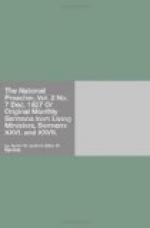Are any of you conscious of disgust and aversion, produced by such doctrines? O, beware, lest that come upon you which is spoken in the prophets, Behold, ye dispisers, and wonder, and perish: Beware lest you convert the bread of life into the poison of death!
Have any of you already attained such a degree of blindness and perversity, as to persuade yourselves that the doctrines of the cross are really irrational and absurd, and that you are doing right in opposing and deriding them? Recollect, I pray you, with whose word you are contending;—whose wisdom you are despising! Let the chaff contend with the tempest, and the stubble with the devouring flame; let the glow-worm despise all the lamps of heaven;—but Oh, let not a worm contend with Omnipotence; let not dim reason reject all the splendours of the Sun of righteousness. The redemption of the soul is precious—Its rescue from perdition, and elevation to God’s right hand, are objects too momentous, to be sacrificed to the pride of intellect, or to the fashion of a world which passeth away. Receive, then, with meekness the ingrafted word, which is able to save your souls. But be ye doers of the word, and not hearers only, deceiving your own selves.
SERMON XXVII.
BY ELIHU W. BALDWIN, A.M.
NEW-YORK.
THE FINAL JUDGMENT.
HEBREWS, IX. 29.—After this the Judgment.
Whilst another year is ending, and time itself, as it respects us, is fast hastening to its close, the question very naturally arises, What shall come after death? The voice of inspiration replies, After this the Judgment. There is no need of entering upon a laboured proof of the doctrine so plainly declared, That there will be a day of Judgment for mankind. It is what seems written by the finger of God himself upon the consciences of men. The impression is nearly universal, with Pagans and Mahomedans, as well as Jews and Christians, that every one of us shall give account of himself to God. This impression is strengthened by a view of the very unequal and indiscriminate allotments of the present life. Here the virtuous are often the objects of hatred and relentless persecution. Here the man of ambition and dark intrigue, circumvents and treads down his more honest rivals. Here Providence often afflicts even the most pious; while the licentious, and proud, and oppressive, are, perhaps, suffered to enjoy uninterrupted prosperity. Now we believe, assuredly, that “God is just;” and we infer, that he will so exhibit himself by another and more equal distribution of his favours and frowns. We conclude with the wise man, “that God shall judge both the righteous and the wicked.” Conscience and reason, then, unite with revelation, in saying, that “God hath appointed a day, in which he will judge the world in righteousness.” No language can be plainer, and no event more reasonably anticipated.




